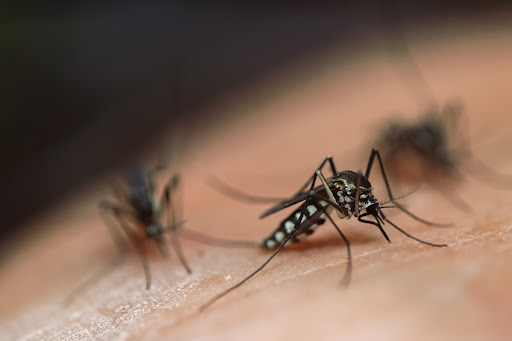
Mosquitoes are more than a nuisance for most people during warmer temperatures. They can also carry with them dozens of diseases. Some of these diseases have devastated developing nations and people who lack the medical care and services we have in the US. You’ve probably heard many of these names on TV or in the news. Here are more about five diseases mosquitoes can carry:
Zika
There have been multiple Zika virus scares in the US over the last few decades. However, since 2018, there haven’t been local mosquito-borne Zika virus transmissions reported in the US. There are no vaccines or medicines to treat Zika, and it can spread in more ways than just mosquito bites. The most common symptoms of Zika virus are fever, rash, headaches, joint pain, red eyes, and muscle pains. Unlike other mosquito-borne illnesses, however, most people do not get sick enough from Zika to wind up in the hospital. Once someone has been infected with the virus, they’re likely to be protected from future infections. Pregnant women should take special precautions regarding Zika, as it has been linked to birth defects like microcephaly, stillbirth, and others.
Malaria
Malaria is a life-threatening disease that’s transmitted by a parasite in certain female mosquitoes. However, despite its broad reach, it’s both preventable and curable. The World Health Organization reported in 2020 that Africa carries a disproportionately high number of malaria. Over 95% of malaria cases are in the region, as are 96% of malaria deaths. There are two species of malaria parasite that pose the biggest threat to humans — P. falciparum and P. vivax. The former is largely found in Africa, the latter exists in most countries outside of sub-Saharan Africa. If you ever travel to a region with a large malaria problem, take the advised medications with you when you travel. WHO issues a list of both medications and vaccinations needed to travel abroad.
West Nile Virus (WNV)
West Nile Virus is the leading cause of mosquito-borne disease in the continental US. There are currently no vaccines or medications to prevent or treat WNV. Latest data from the CDC shows that 1 in 5 people infected develop fever or symptoms of the virus. Roughly 1 in 150 will develop a serious (sometimes fatal) illness. Symptoms include joint pains, vomiting, rash, body aches, and headaches. The best way to prevent getting WNV is to wear proper insect repellent and wear long pants and long sleeved shirts in mosquito-heavy areas.
Chikungunya
This virus is a bigger threat to people who travel to countries in Africa, the Americas, and certain parts of Asia and Europe. As with other mosquito viruses, symptoms include a fever, joint pain, headaches, muscle pain, joint swelling and rash. There’s currently no vaccine to prevent or medicine to treat this virus. Since travelers are more likely to get the virus, it’s important to always use bug repellent and stay in places with AC or screens.
Dengue
Dengue is spread through the bite of an infected Aedes species of mosquito. While dengue is mostly associated with certain regions of the world, over 4 billion people live in areas with a risk of dengue fever. These areas include some US territories and associated states. The most common symptoms of dengue include fever alongside nausea, vomiting, rash and aches. There’s actually a relatively new dengue vaccine, and it’s been approved for use in children as young as 9 years old.
While some of these diseases aren’t an issue for most Americans within the states, mosquitos can still lead to health issues beyond these five common viruses. Take a proactive approach to treating mosquitoes. Always use appropriate sprays, invest in citronella as deterrents, and if you’re traveling, be aware of any advisories about mosquitoes in the travel area. If you’re struggling with mosquitos in your area, give us a call at 515-279-7378 or contact us online to schedule a free inspection.
